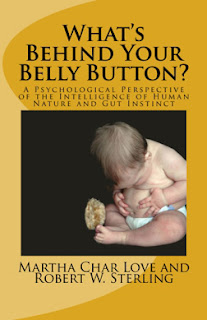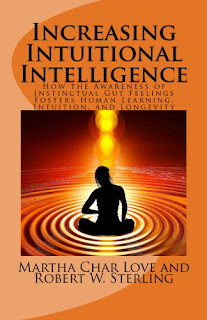"We have two instinctual needs that the gut gauges—the need to feel accepted
and the need to be in control of our own responses to life. These two needs
must be constantly in balance. Too much of one without the other leaves us
empty."
Our first book What’s Behind Your Belly Button? has been on the market for seven years as of this month, and yet my colleague Robert Sterling and I are sure the important discoveries that we made in our work and covered in this book concerning gut feelings and intuition are still unexplored for the most part in modern psychology. To help this exploration of our work, we have briefly outlined below what we found in counseling hundreds of people and using what we called The Somatic Reflection Process to access gut feelings, recover memory, and unite body and mind for wellness and successful life decision-making. These keys below represents the core of our findings on gut intelligence. We hope they help in the exploration and understanding of inner most gut feelings and how to listen to the voice of one’s gut to have a healthier and more beneficial life experience with a relief of stress and an increase of vitality and Intuitional Intelligence.
It is our hope that
with the research being done today using brain imaging to understand how
various healing modalities work to restore both memory and good health, we will see some of this research also taking into account our findings on the gut response and will study these important concepts further. (See What's Behind Your Belly Button? A Psychological Perspective of the Intelligence of Human Nature and Gut Instinct and
also its companion book Increasing Intuitional Intelligence: How the Awareness of Instinctual Gut Feelings Fosters Human Learning, Intuition, and Longevity)
Twelve Keys to the Importance of the Gut Response for Body-Mind Unity and Vitality
1. The gut is the instinctual response center and we feel either empty or full or somewhere in the middle (imagine a gas gauge) in our gut at all times.
2. We feel full when our instinctual needs are met and empty when they are not. We are talking not just about food intake (although the feeling of emptiness and fullness in relation to food intake and psychological instinctual needs are interestingly similar and we do get them confused and thus may over eat to try to fill the emptiness we feel psychologically). We are talking about psychological instinctual needs—psychological not in the use of logic but in our needs as human beings.
3. We have two instinctual needs that the gut gauges—the need to feel accepted and the need to be in control of our own responses to life. These two needs must be constantly in balance. Too much of one without the other leaves us empty.
4. When we have both of these instinctive needs met, we feel full and thus energized; and when we have neither met, we feel empty and often experience some symptoms of stress in the body like feeling lethargic, anxious, overwhelmed, disconnected and alone.
5. The gut response does not depend on the thinking brain as the gut is an independent brain of its own (see Dr. Michael Gershon’s research), but of course it can be greatly affected by the thinking brain, and vice-versa.
6. We work both consciously and unconsciously to keep these
two instinctual needs in balance at all times.
7. At best, we need to have a balanced and conscious dialog between our gut responses and head response so we can use our thinking brain to make the appropriate responses in the external world and try to fill these two important instinctual needs in appropriate and successful ways.
8. When we are unconscious of our gut responses, our
thinking brain will often use a system of thought it has picked up (perhaps
from an authority like a parent, teacher or even a religious interpretation)
and applies it as a judgment about the feeling in our gut. This is what happens
when we have an emotion like guilt or depression. We feel empty because our
needs are not met and our thinking brain attaches a thought to the emptiness
and lack of our fulfillment like “It is all my fault for being too stupid or
too small or too incompetent, etc.” or “I am not capable of doing anything to
make this work or be better” or "I am not worthy or deserving", thus
we have guilt and or depression feelings.
9. The emotional feelings are not pure feelings of emptiness or fullness anymore, as they now have the thinking component mixed in them. And these thinking-feelings or emotions are mostly felt in other parts of our bodies above our hara, between our head brain and gut brain. If you look into your emotional feelings, you can always find a thinking element to them. And if you trace the feeling aspect only, it goes directly and purely to the gut. For as we have said, the gut is the source of all feeling.
10. Generally, the only way we can unravel this tightly woven thread of inaccurate thinking judgment and resulting emotional stress, is to reflect back to the source of when the thinking head first applied this very same judgment and find the actual source or as close to it as possible. And the key to finding this first experience is through reflection on the gut feeling of emptiness and fullness, not through thinking back on the details of our lives.
11. Once we find this original experience in which we started the “tape” that plays over and over in our heads that we are all at fault, powerless, too needy, unlovable, etc., then we can lift the sentence we have placed on ourselves and our feelings and begin to see ourselves clearer and make healthy decisions—begin to use our thinking head to follow our instinctual needs and fulfill our true human nature.
12. Reflection on the gut voice helps us to be more mindful of our caring nature and thus be more caring for others. And with the new awareness of our gut responses and needs that we acquire through reflection on our instinctual gut responses, we are able to live a more caring and healthy life with the thinking head finally conscious and listening more clearly to the responses of our most reliable and authentic self—our gut instinctual feelings in our body.
Click on a book cover below to go to Amazon to Buy:
and it is on The Book Depository with free international shipping.
"Increasing Intuitional Intelligence" is also available on Amazon USA and Amazon UK
Be sure and keep scrolling to our next blog article: Our 25+ Most Viewed Blog Articles on Exploring Gut Intelligence, Gut Feelings, Memory and Instincts. Since we have
been posting this blog site now since 2009, there may be some important
posts that you have
missed and so we have made a
convenient links
list, up-to-date, that would be a summary of all the important post on
this blog exploring gut intelligence.







